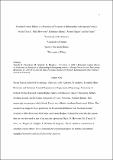Files in this item
Extended contact effects as a function of closeness of relationship with ingroup contacts
Item metadata
| dc.contributor.author | Tausch, Nicole | |
| dc.contributor.author | Hewstone, Miles | |
| dc.contributor.author | Schmid, Katharina | |
| dc.contributor.author | Hughes, Joanne | |
| dc.contributor.author | Cairns, Ed | |
| dc.date.accessioned | 2015-07-08T16:10:02Z | |
| dc.date.available | 2015-07-08T16:10:02Z | |
| dc.date.issued | 2011-03 | |
| dc.identifier | 7658151 | |
| dc.identifier | df252de2-c162-403d-982d-0bb7ee01decd | |
| dc.identifier | 000288792000007 | |
| dc.identifier | 79953245444 | |
| dc.identifier.citation | Tausch , N , Hewstone , M , Schmid , K , Hughes , J & Cairns , E 2011 , ' Extended contact effects as a function of closeness of relationship with ingroup contacts ' , Group Processes and Intergroup Relations , vol. 14 , no. 2 , pp. 239-254 . https://doi.org/10.1177/1368430210390534 | en |
| dc.identifier.issn | 1368-4302 | |
| dc.identifier.other | ORCID: /0000-0002-9471-0673/work/46362123 | |
| dc.identifier.uri | https://hdl.handle.net/10023/6934 | |
| dc.description.abstract | Using survey data from Catholics and Protestants in Northern Ireland (N = 428), the authors examined the effects of extended contact via different types of ingroup contacts (neighbors, work colleagues, friends, and family members) and tested whether closeness to ingroup contacts moderated the effects of extended contact on outgroup trust. Results demonstrated that extended contact effects varied as a function of the relationship to ingroup contacts, and that extended contact interacted with closeness ratings in predicting outgroup trust. Consistent with hypotheses, extended contacts via more intimate ingroup relationships (i.e., friends and family) were overall more strongly related to outgroup trust than extended contacts via less intimate ingroup relations (i.e., neighbors and work colleagues). Moreover, within each level of intimacy extended contact was related to outgroup trust only at high, and not at low, levels of rated closeness to ingroup contacts. The theoretical contributions, limitations and practical implications of these findings are discussed. | |
| dc.format.extent | 16 | |
| dc.format.extent | 194286 | |
| dc.language.iso | eng | |
| dc.relation.ispartof | Group Processes and Intergroup Relations | en |
| dc.subject | Closeness | en |
| dc.subject | Extended contact | en |
| dc.subject | Inclusion of the Other in the Self | en |
| dc.subject | Northern Ireland | en |
| dc.subject | outgroup trust | en |
| dc.subject | Cross-group friendships | en |
| dc.subject | Northern-Ireland | en |
| dc.subject | Intergroup contact | en |
| dc.subject | Mederating role | en |
| dc.subject | Mediating role | en |
| dc.subject | In-group | en |
| dc.subject | prejudice | en |
| dc.subject | Self | en |
| dc.subject | Inclusion | en |
| dc.subject | Attitudes | en |
| dc.subject | BF Psychology | en |
| dc.subject.lcc | BF | en |
| dc.title | Extended contact effects as a function of closeness of relationship with ingroup contacts | en |
| dc.type | Journal article | en |
| dc.contributor.institution | University of St Andrews. School of Psychology and Neuroscience | en |
| dc.identifier.doi | 10.1177/1368430210390534 | |
| dc.description.status | Peer reviewed | en |
This item appears in the following Collection(s)
Items in the St Andrews Research Repository are protected by copyright, with all rights reserved, unless otherwise indicated.

